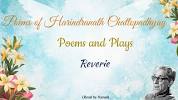Collated by Tusar Nath Mohapatra
Evergreen Essays
All problems of existence are essentially problems of harmony. - The Life Divine
Tuesday, April 08, 2025
Complex web of political forces have moulded West Bengal
Friday, February 21, 2025
Desire to stay in social harmony
Collated by Tusar Nath Mohapatra
Devotees from different parts of the country thronged Sri #Aurobindo Ashram on the occasion of the 146th birth anniversary of the Mother, spiritual coordinator of Sri Aurobindo. The Mother's room at Sri Aurobindo Ashram was open for 'darshan'.
@NewIndianXpress @xpresstn #pondy
https://x.com/Sriram_4602/status/1892793828626911652?t=nOj6gz_GZ8ZZs3HkrwLgDQ&s=19
Everything is tribal it seems. And without gods, or another shared morality, politics becomes the shared morality - when it is intended for governance. This can't work because governance isn't about good or evil it's about cooperation (despite moral differences, or short term pain for long term flourishing, or lesser evils etc) to do what's best for the most people. Imposing an absolutist moral framework upon it and keeping one's spiritual wellbeing in its care will destroy the culture. I refuse to abide. So we should hope to god not everything is political.
https://x.com/Grimezsz/status/1891102785111732427?t=yT3llVHOIoZafy14jWmJEw&s=19
There is no any “best for majority of people”. Humans are huge machines that need changes.
Changes are needed.
https://x.com/matterasmachine/status/1891104041188397512?t=EmNaBQBpAk6N7jvmkXMy9A&s=19
Everything is PERSONAL, not tribal.
When you stuff analogical intelligence into a body defended by instincts, "tribe" becomes just another extension of self (MY tribe, MY job, MY family, etc).
Everyone doing this at once, all the time, over time, creates tribal dynamics.
https://x.com/MJPiercello/status/1891108837538549813?t=K9GR0vZU-7yayRlKSmA6JA&s=19
Political governance evolved from religious governance. As population expands, the notion of morality evolved into ethicality, as governing bodies had to decide on what is best course for the entire population.
Also, it's God, capital G.
https://x.com/karmakame_lion/status/1891134241775194441?t=nE3EeJr8bN0UOdtG72-Zow&s=19
Shared morality is needed for the definition of what's best to be the same across society. Without it there are competing moralities and people prepared to fight on both sides to stop evil winning
https://x.com/ChowRabbit/status/1891148561233985776?t=njj8oMymX-eGtupPRLewfw&s=19
There is Absolute Truth and goodness out there. Politics is about discerning and applying that, in reverence to God the Creator and love for one another. The Constitution already sussed a lot of this out, and if you follow its framework, you'll get pretty darn good results.
https://x.com/EnochMetaScribe/status/1891159407695712388?t=IDjNTAjDRiCsEhxUxQIj9w&s=19
Morality is morality , not everything is political .Thankful for that. Politics can be corrupt while good morality is not corrupt. Sometimes, politics confuses some people’s thinking, why it is important for people to know the truth , let go of bias, and try to fix things in a way that really represents the individual rather than people siding with the biases of media. People should be better educated. We can all work together even with differences, But, it has turned into a type of brainwashing by the media, some people defending things that if the truth was known, some probably most would not defend it.
https://x.com/KMatraBeXCourtt/status/1892069552537669707?t=vI-LuNrkK5GT2_FGqaTWRw&s=19
The part of politics that would say 'everything is political' is the practice of giving ones power away to a party/ideal/charismatic leader. Folks who deign to think for themselves do not seem to see everything through a political lens. If you were to look for one unifying ideal or value it is simply: Love.
https://x.com/BootsWH/status/1891113605648581062?t=wWFTzuSrz0ZidcFWo5cpvg&s=19
Completely agree. When politics replaces shared values or spirituality, it becomes a battlefield of tribes rather than a tool for collective progress. True governance requires cooperation across differences, not moral absolutism. Let’s hope society remembers that before it tears itself apart.
https://x.com/frankdasilva/status/1891112184584761597?t=PNm6shJBEBUT43ZsJ1kcWg&s=19
Everything is communication. All, families, communities, nations, and societies are built from their ability to communicate. The more accurate and effective the communication, the stronger and larger the community.
- Politics is the art and science of gaining influence.
- Governance is the process by which a group makes choices.
- Management is the art and science of getting things done.
https://x.com/CraigMaciolek/status/1891110648798380191?t=IhQcZRjC4wQ7EKHU4ZlHGw&s=19
Check out Sri Aurobindo and the Mother on the 'Lord of Nations'. There's a lot that goes on behind the scenes in the astral and causal planes that influences human minds in a sort of mass hypnosis, where people tune into particular rates of vibration that proceed from the minds of deities and demons.
https://x.com/lipsreadbyai/status/1892809947056132181?t=oWpEmc6jWxoxFjBfVW00cg&s=19
Union Minister of Law and Justice Arjun Ram Meghwal: If you see in Auroville people from 54 countries stay together and still no FIR. This is what is called desire to stay in social harmony
https://x.com/barandbench/status/1892583026657214690?t=RlZErZOCnM7PjzfApKBn6g&s=19
Wednesday, September 25, 2024
366 passages on different subjects
Collated by Tusar Nath Mohapatra

Imagination and Science sriaurobindostudies.wordpress.com/2024/09/24/ima… via @santoshk1
https://x.com/santoshk1/status/1838588167882182696?t=ge5z9Ef75fezbkUB6WTXZg&s=19
“This is one of the great mysteries: where did Shakespeare find these books? Whose libraries did he raid?”
https://x.com/five_books/status/1838571588762878002?t=Ls1GEVlsU37yUYbfqKCPKA&s=19
Wright Thompson wanted to understand the forces that shaped Mississippi's dark history. He ended up in Spain, holding an object he'd never known existed:
https://x.com/peterheehs/status/1838589147159622116?t=X6Jfal3WMzolzo5nFCZzKQ&s=19
I have been studying the Bhagavad Gita every morning for the past couple of months.
I have read the other semitic tomes. And I can say unambiguously, that the Gita is the greatest manual for living one's life. The philosophy, the way that Shri Krishna brings it out slowly and explains it, is just incredible. None of the "I am God. So believe in me and you go to Heaven" simplicity.
There is so much nuance and rationality. It is amazing what heights Hindus achieved in their philosophical discourses when the rest of the world was struck with tribal, jealous gods.
Unbelievable.
https://x.com/ArunKrishnan_/status/1838591562336415858?t=sW8u2PfIHFlBc7_xtNGHdg&s=19
Dr. Ramesh Bijlani has compiled a new book from the writings of Sri Aurobindo titled The Diary Divine: Daily Dose of Timeless Wisdom. With 366 passages on different subjects, it has been conceived in such a way that "if one reads one page a day, the book would be over in a year."
https://x.com/SavitriEra/status/1838633359511294025?t=rQgPpdN5SY-FMG-U0BBcmw&s=19
What Is The Sacred?
We know it as holy, divine, eternal, and host of other words— but what is it really and why is it important? "What is the need for the sacred and sacrifice in a world such as ours? Hasn’t the desacralisation of nature and life given us everything we ever wanted?"
For the latest on @Rasajournal, I borrowed some insights from Roberto Calasso's Ardor.
rasajournal.substack.com/p/what-is-the-…
https://x.com/Rasajournal/status/1838538741196919225?t=9xeJ2xDvldUztACSLWww5w&s=19

